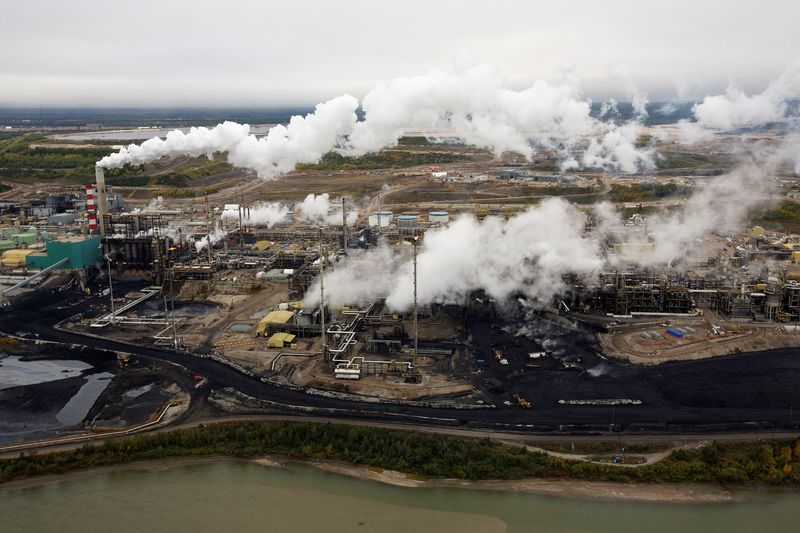By Nia Williams
CALGARY, Alberta (Reuters) -Canada's first emissions reduction roadmap relies heavily on the oil and gas sector to help Ottawa reach its 2030 climate goal, but there is a still a big gap between what industry and government say are achievable cuts.
Oil and gas is Canada's highest-polluting sector, accounting for 26% of total emissions. If Prime Minister Justin Trudeau's Liberal government is to meet its climate target of reducing overall emissions 40%-45% below 2005 levels by 2030, the oil and gas industry will need to make drastic cuts.
So far, Canada has missed every emissions reduction goal it has set, with oil and gas pollution rising 19% between 2005 and 2019. Canada's new Emissions Reduction Plan, announced on Tuesday, aims to cut oil and gas emissions by 42% from current levels by 2030.
"Ambition is one thing, action is what's required," Suncor Energy (NYSE:SU) Chief Executive Officer Mark Little told a sustainability conference in Vancouver on Tuesday, adding that industry needed to work with government to align climate targets.
The Oil Sands Pathways to Net Zero Alliance, a group of six Canadian oil and gas companies including Suncor, is targeting a 32% cut by 2030. The alliance, which accounts for 90% of northern Alberta's oil sands production, is aiming for net-zero emissions by 2050.
"The Pathways Alliance has been clear that the interim goals set for our industry must be flexible, realistic and achievable," Kendall Dilling, the interim director of the group, said in a statement.
Trudeau's government, which has had a strained relationship with the oil and gas industry since coming to power in 2015, is also developing an oil sands emissions cap as it promised in the last election campaign.
Natural Resources Minister Jonathan Wilkinson said he had spoken to the members of the alliance about the emissions reduction goal.
"What we have done is set some ambitious targets, and we're going to sit down with the sector and work with them to ensure that we actually do have a plan and a pathway to achieving them," Wilkinson said in a telephone interview.
HEAVY LIFT
Ottawa is relying on a handful of levers to slash oil and gas emissions, such as cutting methane output and embracing new technologies including carbon capture and storage (CCS), said Dave Sawyer, principal economist at the Canadian Climate Institute.
CCS involves capturing and permanently sequestering emissions underground, a costly process that the oil and gas sector wants public money to help fund. After months of negotiations Ottawa is expected to announce a CCS tax credit in the 2022 budget next week.
"Industry's job is to keep costs down and transfer the risk from their shareholders to someone else, so there's a discussion here around subsidizing emissions reductions," Sawyer said.
That is despite a surge in cash flows from rising crude prices as Russia's invasion of Ukraine disrupts global oil supplies.
Deborah Yedlin, the CEO of the Calgary Chamber of Commerce, a business lobby group in the heart of the oil patch, said high commodity prices were likely to be short-lived and accelerated climate targets would require more spending on commercial demonstration projects.
"Industry will therefore require government investment in technology through public-private partnerships," Yedlin said.
Many environmental campaigners have accused the oil and gas industry of not doing its fair share. The sector is expected to cut emissions by 31% from 2005 levels by 2030, far less than the electricity sector's 88% reduction, but still more than the transportation industry's 11% cut.

"We need an all-hands-on-deck-approach to climate action, but according to this plan, some sectors - most notably oil and gas - will not contribute their fair share, letting the burden fall on workers, consumers, and other industries," said Caroline Brouillette, national policy manager for Climate Action Network Canada.
($1 = 1.2498 Canadian dollars)